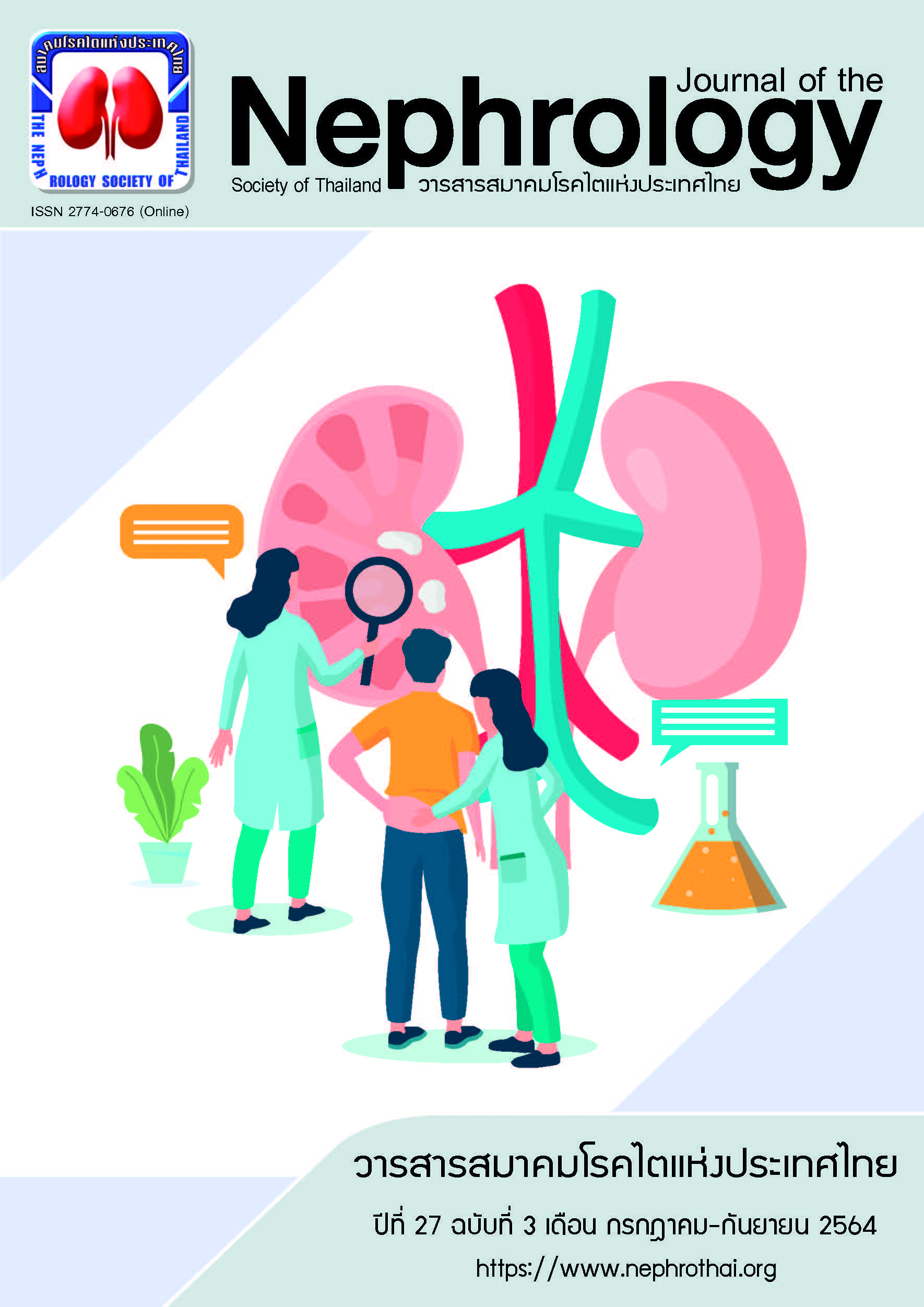Effect of medication adherence on renal allograft outcome in postkidney transplant patients
Main Article Content
Abstract
Background: Assessing medication adherence among patients postkidney transplant is vital to provide the best chance for kidney survival following transplantation. Currently, the immunosuppressant therapy adherence instrument (ITAS) is the only validated questionnaire that is widely used among Western patients after organ transplant. However, this tool has never been used in Thailand.
Methods: This study was divided in 2 phases. First, a cross-sectional study was conducted to validate the Thai-version ITAS in a small group of patients postkidney transplant using Cronbach’s coefficient was employed to determine the reliability of the questionnaire. Second, a retrospective cohort study was conducted to determine the effect of medication adherence on primary composite renal graft outcome, including graft failure, graft rejection, GFR decline >50% or biopsy-proven interstitial fibrosis and tubular atrophy (IFTA), among patients postkidney transplant. Kaplan-Meier was applied to determine incidence of composite graft outcomes in both groups. Multivariate Cox regression was applied to assess the factors associated with medication adherence, and renal allograft outcome.
Results: In Phase I, ITAS was validated in among 40 patients postkidney transplant. Cronbach’s coefficient of the validated Thai version ITAS was 0.88. In Phase II, 198 patients postkidney transplant were enrolled to assess medication adherence using the validated Thai-version ITAS. In this study, 153 (77.27%) patients achieved good adherence (ITAS score = 12) while, 45 (22.73%) exhibited poor adherence (ITAS score <12). No significant difference was found in baseline characteristics among patients between both groups and no factor significantly correlated with medication adherence. Kaplan-Meier analysis showed higher incidence of composite renal allograft outcome among patients with good adherence compared with poor adherence. From multivariate analysis, factors associated with composite graft outcome included AKI donor, ECD donor, and poor medical adherence (ITAS score <12) with adjusted hazard ratio 4.00 (95%CI 1.25-12.86), 4.11 (95%CI 1.28-13.19), and 4.05 (95%CI 1.42-11.54), respectively.
Conclusion: Assessing patient medication adherence using feasible and reliable tools is vital to achieve treatment goal providing the best chance for kidney survival and function.
Article Details

This work is licensed under a Creative Commons Attribution-NonCommercial-NoDerivatives 4.0 International License.
This article is published under CC BY-NC-ND 4.0 license, which allows for non-commercial reuse of the published paper as long as the published paper is fully attributed. Anyone can share (copy and redistribute) the material in any medium or format without having to ask permission from the author or the Nephrology Society of Thailand.
References
Golshayan D, Pascual M. Burden of end-stage renal disease and evolving challenges in kidney transplantation. Transpl Int. 2019;32(9):889-91.
Sellares J, de Freitas DG, Mengel M, Reeve J, Einecke G, Sis B, et al. Understanding the causes of kidney transplant failure: the dominant role of antibody-mediated rejection and nonadherence. Am J Transplant. 2012;12(2):388-99.
Osterberg L, Blaschke T. Adherence to medication. N Engl J Med. 2005;353(5):487-97.
Turner BJ. Adherence to antiretroviral therapy by human immunodeficiency virus-infected patients. J Infect Dis. 2002;185 Suppl 2:S143-51.
Nachega JB, Chaisson RE, Goliath R, Efron A, Chaudhary MA, Ram M, et al. Randomized controlled trial of trained patient-nominated treatment supporters providing partial directly observed antiretroviral therapy. AIDS. 2010;24(9):1273-80.
Kozma CM, Dickson M, Phillips AL, Meletiche DM. Medication possession ratio: implications of using fixed and variable observation periods in assessing adherence with disease-modifying drugs in patients with multiple sclerosis. Patient Prefer Adherence. 2013;7:509-16.
Stewart RB, Caranasos GJ. Medication compliance in the elderly. Med Clin North Am. 1989;73(6):1551-63.
Chisholm MA, Lance CE, Williamson GM, Mulloy LL. Development and validation of the immunosuppressant therapy adherence instrument (ITAS). Patient Educ Couns. 2005;59(1):13-20.
Lorenz EC, Smith BH, Cosio FG, Schinstock CA, Shah ND, Groehler PN, et al. Long-term Immunosuppression Adherence After Kidney Transplant and Relationship to Allograft Histology. Transplant Direct. 2018;4(10):e392.
Dew MA, DiMartini AF, De Vito Dabbs A, Myaskovsky L, Steel J, Unruh M, et al. Rates and risk factors for nonadherence to the medical regimen after adult solid organ transplantation. Transplantation. 2007;83(7):858-73.
Kenawy AS, Gheith O, Al-Otaibi T, Othman N, Abo Atya H, Al-Otaibi M, et al. Medication compliance and lifestyle adherence in renal transplant recipients in Kuwait. Patient Prefer Adherence. 2019;13:1477-86.
Al-Sheyyab A, Binari L, Shwetar M, Ramos E, Kapp ME, Bala S, et al. Association of medication non-adherence with short-term allograft loss after the treatment of severe acute kidney transplant rejection. BMC Nephrol. 2019;20(1):373.


